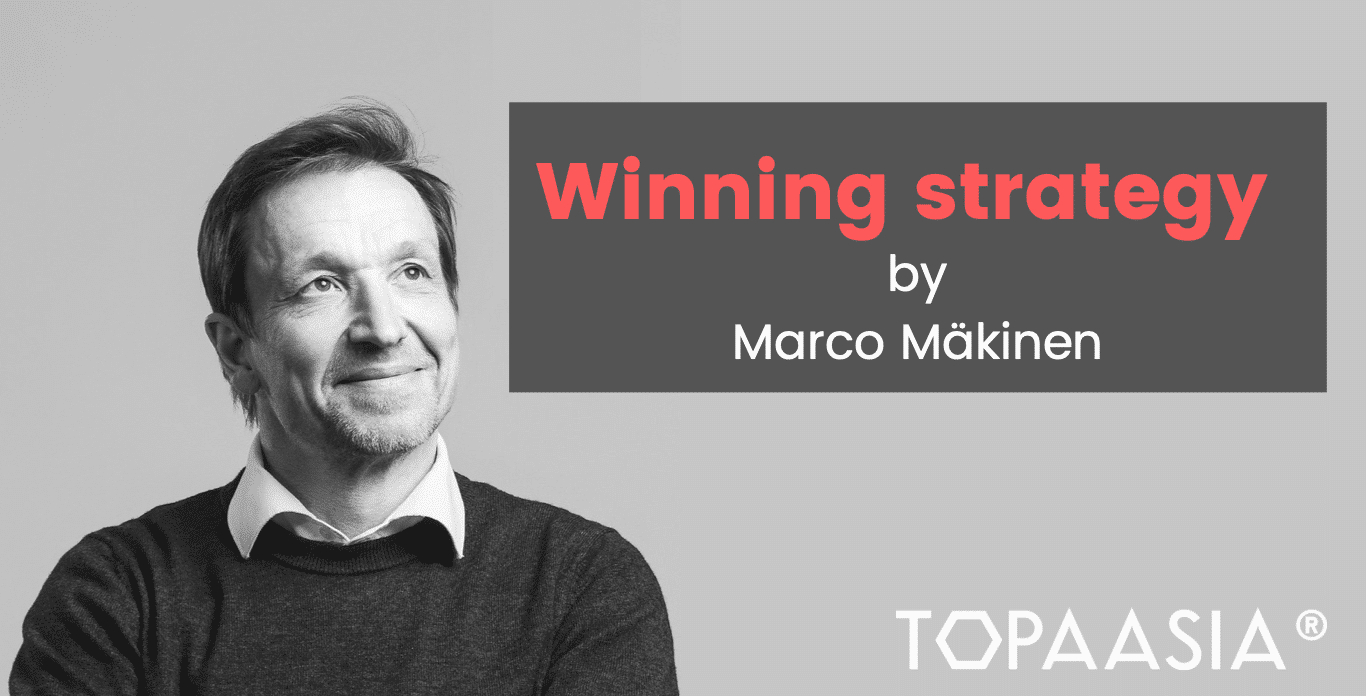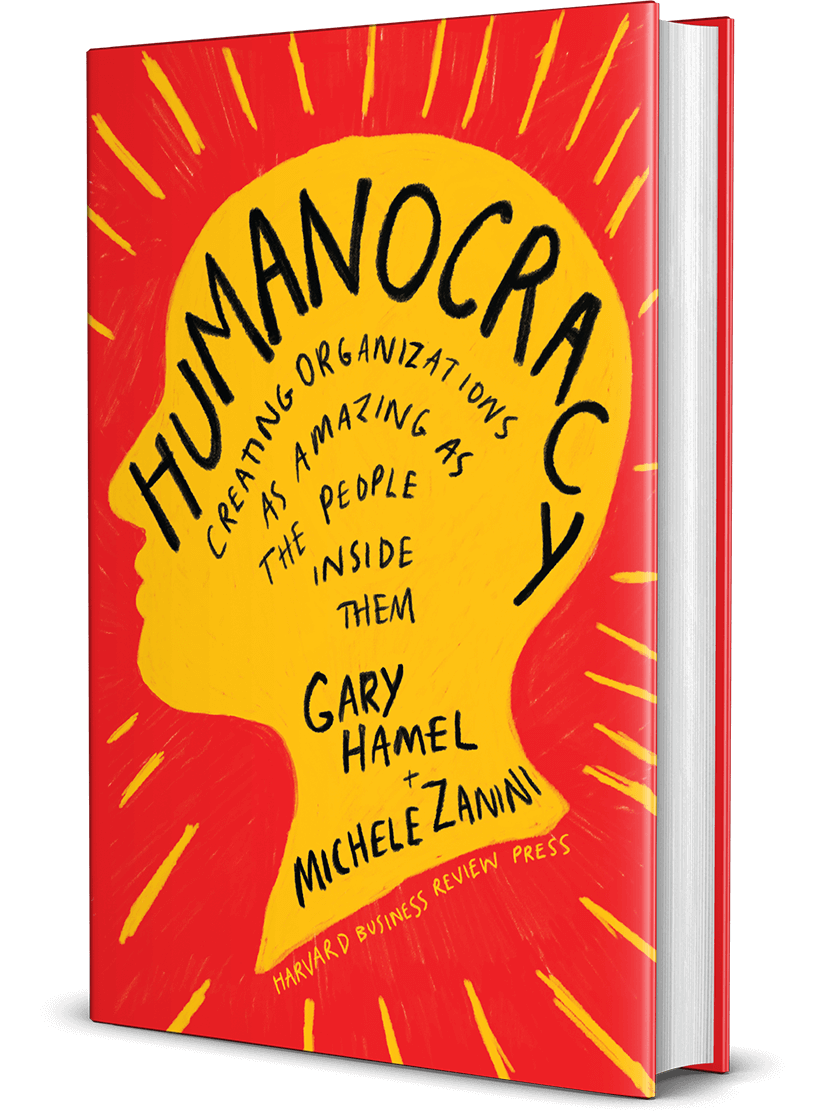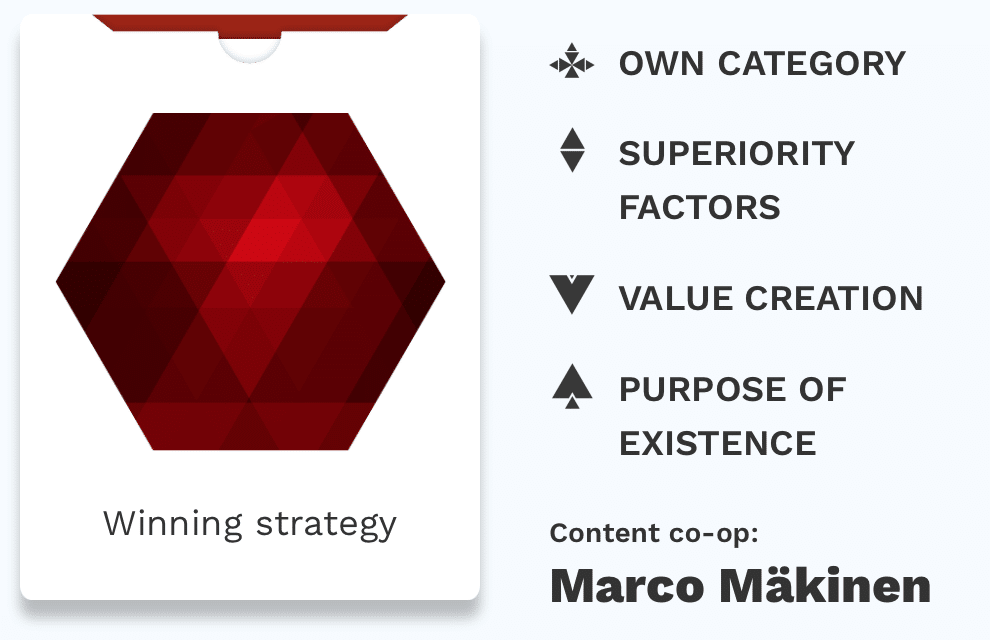Winning strategy, an interview with Marco Mäkinen

In this interview, Marco Mäkinen, an veteran of the advertising world, a triathlete, non-fiction writer and TBWA / Helsinki’s vice president, shares his thoughts on a winning strategy. Together with Marco, we built a Topaasia deck “Winning Strategy” that bundles 52 things to consider when building and executing a winning strategy.
What do you like to promote in your professional life?
My heart beats for businesses. They are a powerful force for change in a world where it is known what should be done, but change is painfully slow. I am motivated and happy to help individuals and all kinds of organizations, but there are dynamics in companies in particular that can at best change the world.
There are people in companies who, with their own decisions, can make the lives of thousands, even millions, better.
I feel that my own job as an outside sparrer is to ask stupid questions, marvel, challenge and thereby help make smart decisions. This is how I feel myself useful and part of something bigger.
I help companies clarify:
- Why do they exist?
- What do they do differently, better?
- How to tell about these things?

Four sample cards from Winning strategy – Topaasia deck
I have spent the last 30 years on these themes. The moments I remember and that have given the best kicks have been the ones where we have pondered questions like:
- Should I start doing this thing that hasn’t been done before?
- Doesn’t this seem a bit impossible?
- Is this even possible in principle?
- Do we dare to do?
- Are you ready to do?
In my job as a consultant, I think it is good to be so that if the work is successful, it is mainly worth keeping a low profile and if the work fails, apologize and learn.
Why is strategy important and interesting to you? How did you end up as a strategy expert?
When I started working, I didn’t know I was interested in strategy because I didn’t even understand what it meant. Little by little, I noticed that all things returned to certain basic questions:
- Why is something being done at all?
- How are things done differently?
- What concrete will we do next?
It seems that strategy work is one that goes back from the constant hustle to the most important issues. I have found that things are easily complicated and then argued that it is a strategy. I don’t care much about complication, but I like to emphasize the basics, because it’s all up to them.

You read a lot of books, what comes to mind about strategy literature?
Some classics:
- Miyamoto Musashi: Earth, water, fire, wind and void. Old samurai remarks on how to win.
- Richard P.- Rumelt: Good Strategy Bad Strategy: The Difference and Why It Matters. Bright thinking.
- Alan Lafley: Playing to Win. How Strategy Really Works. How strategic choices are applied in practice.
From this year (2021):
- Adam Grant: Think Again. The power of knowing what you don’t know.
- Martin Lindström: The Ministry of Common Sense. How to eliminate bureaucratic red tape, bad excuses and corporate BS.
At the moment, I find that I have a terrible anxiety about how bureaucratic corporations have become and I read a lot of books that fight bureaucracy. I read Gary Hamel’s Humanocracy again and I find myself thinking “Just like this! That’s how it should be done! ” This is for me more inspirational literature for the daily struggle against stupid rules and processes that often get in the way of core issues. I think it is worth taking the time to think about the strategy and always return to basics.
If we go to real classics, Earth, water, fire, wind and void, an old work by a Japanese samurai is a hell of a book that focuses only on what needs to be done to win. I think that’s smart – yes you can make strategy documents to your liking but it’s a different matter when you’re in a race and trying to win. Documentaries don’t help if you don’t make a profit and focus on winning.
Core issues & change
The oldest works of strategy literature – whether it was about warfare or the art of fencing – are about core issues. Today, the basic questions and the core issues are exactly the same, but the talk is more on the level of “What is changing now in this hybrid world of digitalization?”
Change is another interesting theme and I am constantly trying to read, figure out and understand how change happens and how one can change oneself or others. In recent years, there have been a huge number of books that open up a perspective on change for individuals like Atomic Habits. They talk about “if you want to quit smoking, do this”. On the corporate side, there are far fewer of these books. Going back to the books that were written even 40 years ago, I find that they are pained with exactly the same things as in today’s digital revolution. Nothing has changed.

I also read a lot of genuine stories of successes and failures. I’ve been looking forward to reading how Volkswagen ended up making emissions scams, how Theranos inadvertently ended up pissing the whole world and stories where someone has concretely managed to build a new successful company. These are hellishly instructive, as I find that success stories don’t go as in textbooks in the style of “first this was done, then this was done and then successful” but doing is quite a hazzle.
I think reading history helps to deal with the chaos of life. In history, you will notice that in every war, in every start-up, in every great thing that is built, there is hazzle and chaos just the same. This is reassuring if you find yourself confused about doing things unorganized and how confusing our company is.
From the perspective of a winning strategy, I have read several books on pre-World War II England over the past year. I read these a lot during the pandemic when it felt like bombs were raining down my neck. Reading Churchill’s first year as prime minister (The Splendid and the Vile, Larson) brought good perspective, because he had to endure real bombs and constant belittlement from his peers. These books are great examples of simultaneous bright strategic thinking, keeping your head cold in a bad place, and finally winning.

What is the difference between a strategy and a winning strategy?
Someone can say that “now we have a strategy because we have documented something” – this is not really true. There are many ways to document a strategy, present a strategy document, and bang braces, but that is not the point of the strategy. The point is whether the whole team has internalized the thoughts on the basic issues and how bright they are in everyone’s minds.
In addition to this, it must be considered whether the strategy can be a winning one. Thoughts can be bright but you can still lose all the time. In that case, the question is whether we use strategic methods in way that we start winning. For example, in theory a sports team knows how to win: a lot of goals are scored and a lot goals are blocked in our end – this is not a difficult strategic line. The situation changes when faced with an insanely tough team and then the tactical side comes along.
A winning strategy is one that constantly asks genuine, real questions and thinks about how we can become better than others. It is always necessary to return to the basic questions from time to time and do corrective movements. A mere strategy is a piece of paper with documented answers to these questions. Of course, the alternative is that there is no strategy at all and even then you can win with luck. But if you want to win time after time and permanently, a good strategy will help because it clarifies things.
So in a nutshell:
1. Winning without a strategy is a hustle that can accidentally bring victory. When asked afterwards it is not really known why the victory was achieved and if the same should be re-created it is not known how.
2. You have a strategy, but you never win, telling you that you are just a theorist. In theory, you know better how things should be done, but you end up not doing things that you know are right.
3. A winning strategy is to use strategic thinking all the time, to improve and to win.

The Winning Strategy game was built under four themes, why are the four suites in the deck exactly these four suites?
Here is the summary of what the themes of a winning strategy mean:
1 . The purpose of existence – If this is thoughtful and clear, we can handle more stuff the world throws at us. Even difficulties are overcome when we know why we exist and why we do what we do.
2. Own category – If you do not want to constantly lower prices and lay off people, you should not compete with the same things as others, but try to create something new and your own. This is a key part of a winning strategy and therefore its own suite in this deck.
3. Superiority factors – This is more of a traditional positioning. Where we must be insanely good? Where is it enough to be mediocre? Where are we consciously bad? This is also important, because it is not enough to have a clear purpose of existence and your own category if you are not good at what you do.
4. Value creation – Ultimately, no matter how full of oneself you are and have a good feeling, value is created through the customer’s glasses. How does what we do make the customer feel? Do we remember that the customer has options? The customer may not purchase at all or choose a competing product or service.
Under these themes we formed 52 relevant cards to help you create a winning strategy.

Winning Strategy – There are 52 different cards in the game to build a winning strategy
Who should play the Winning Strategy game and when?
This would be useful to play at all levels:
1. The board should play with management to see if you are on the same page at all. The benefit of such gamesession and in-depth content is that there are not many areas left that have not been talked about at all, but a common understanding emerges of what our way of winning is and what we believe in.
2. Management should play with different employee groups and teams. A winning strategy is one that the organization should play through at least once a year.
3. I think it is crucial that the management team plays once a quarter. By constantly playing you can see how the situation has changed, you can notice that the purpose of existence is evolving and the factors of superiority have changed.
4. In general, I think whenever you want to stop to think about core issues.
